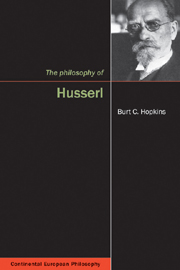Book contents
- Frontmatter
- Contents
- Acknowledgements
- Abbreviations
- Prolegomenon: Husserl's turn to history and pure phenomenology
- I Plato's and Aristotle's theory of eidē
- II From descriptive psychology to transcendentally pure phenomenology
- III From the phenomenology of transcendental consciousness to that of monadological intersubjectivity
- IV From monadological intersubjectivity to the historical a priori constitutive of all meaning
- V The unwarranted historical presuppositions guiding the fundamental ontological and deconstructive criticisms of transcendental philosophy
- 16 The methodological presupposition of the ontico-ontological critique of intentionality: Plato's Socratic seeing of the eidē
- 17 The mereological presupposition of fundamental ontology: that Being as a whole has a meaning overall
- 18 The presupposition behind the proto-deconstructive critique of intentional historicity: the conflation of intrasubjective and intersubjective idealities
- 19 The presupposition behind the deconstruction of phenomenology: the subordination of being to speech
- Epilogue: Transcendental-phenomenological criticism of the criticism of phenomenological cognition
- Coda: Phenomenological self-responsibility and the singularity of transcendental philosophy
- Notes
- Bibliography
- Index
19 - The presupposition behind the deconstruction of phenomenology: the subordination of being to speech
from V - The unwarranted historical presuppositions guiding the fundamental ontological and deconstructive criticisms of transcendental philosophy
- Frontmatter
- Contents
- Acknowledgements
- Abbreviations
- Prolegomenon: Husserl's turn to history and pure phenomenology
- I Plato's and Aristotle's theory of eidē
- II From descriptive psychology to transcendentally pure phenomenology
- III From the phenomenology of transcendental consciousness to that of monadological intersubjectivity
- IV From monadological intersubjectivity to the historical a priori constitutive of all meaning
- V The unwarranted historical presuppositions guiding the fundamental ontological and deconstructive criticisms of transcendental philosophy
- 16 The methodological presupposition of the ontico-ontological critique of intentionality: Plato's Socratic seeing of the eidē
- 17 The mereological presupposition of fundamental ontology: that Being as a whole has a meaning overall
- 18 The presupposition behind the proto-deconstructive critique of intentional historicity: the conflation of intrasubjective and intersubjective idealities
- 19 The presupposition behind the deconstruction of phenomenology: the subordination of being to speech
- Epilogue: Transcendental-phenomenological criticism of the criticism of phenomenological cognition
- Coda: Phenomenological self-responsibility and the singularity of transcendental philosophy
- Notes
- Bibliography
- Index
Summary
As we have seen, Derrida's pre-or proto-deconstructive critique of phenomenology credits Husserl's phenomenology with posing a question about the relation between meaning and fact that it alone (presumably alone among philosophies) can pose, even though it is incapable of providing the answer. The question concerns their “primordial” unity, and Derrida maintains that neither an account limited to meaning nor one limited to facts can by itself answer this question. Neither, however, can both types of an account answer it together, because to answer the question of the unity of meaning and fact would be tantamount to eliminating their difference. The unity at issue here for Derrida is therefore not one of the identity of meaning and fact but of their primordial belonging together despite the opposition that defines their difference. We have also seen that the specifically critical moment of Derrida's proto-deconstructive critique of Husserl is contained in his claim that Husserl's phenomenology nevertheless attempts to eliminate this difference by reducing the infinitude wherein appears the alterity of both the origin and telos proper to ideality's historicity to the singularity of an origin in actual historical fact.
Derrida's deconstruction of Husserl's phenomenology also takes issue with its ability to deal with the inseparable alterity belonging to difference. However, at stake in the deconstruction of phenomenology is something far more monumental than identifying the putative dynamic of an unlimited “disquietude” at work in Husserl's late attempt to come to terms with historicity.
- Type
- Chapter
- Information
- The Philosophy of Husserl , pp. 254 - 263Publisher: Acumen PublishingPrint publication year: 2010

